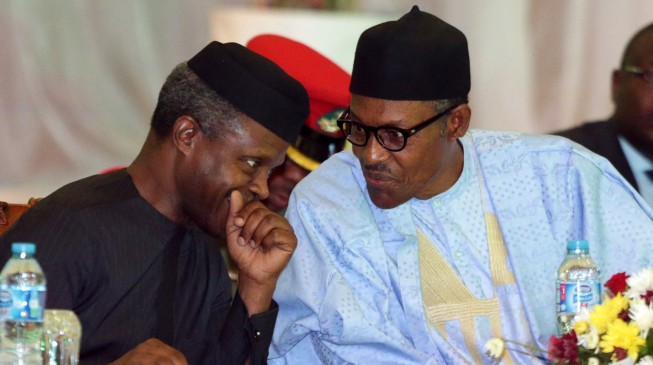
President Muhammadu Buhari presented the 2017 budget to the national assembly on Wednesday, December 14, 2016, promising economic recovery.
As expected the budget, which amounted to N7.298 trillion naira, was different from the 2016 budget in many ways.
We reviewed the 1,047-paged document, and brings you 20 fine details of interest.
Here are some details of the 2017 budget:
Total budget
N7.298 trillion budget.
Aim of the budget
The aim is to pull the country out of recession by spending 30.7 percent on capital expenditure.
Ministry with highest allocation
The ministry of power, works and housing at 520 billion.
More money
The allocation for the Niger Delta Amnesty programme tripled to amount at N65 billion in 2017 as against 20 billion in 2016. Also, the allocation for the Judiciary increased to N100 billion in 2017 as against 70 billion in 2016.
Restore life to the Northeast
45 billion was allocated for rehabilitation of the northeast
Benchmarks:
Crude oil: $42.5 per barrel as against $38 in 2016,
Naira: N305 per dollar as against N197 in 2016
Loans for entreprenuers
N15 billion was budgeted for the Bank of Industry and Bank of Agriculture. $1.3 billion was also budgeted for the Development Bank of Nigeria, which is expected to kick off operations in 2017.
Tax credit for exporters
N20 billion was budgeted for the Export Expansion Grant which is expected to encourage exporters.
More loans
N500 billion was budgeted for the Special Intervention programme (Home grown school feeding and N-Power Job creation programmes)
Revenue
Udo Udoma, the minister of budget and national planning, has said that the government expects to make 10 trillion as revenue for 2017 fiscal year and N5 trillion would be from the sale of crude oil.
“Non-oil revenues will rake in about N5.06 trillion. These revenues are expected to come from corporate and company taxes, Nigeria Liquefied Natural Gas, Stamp Duties, capital gains tax and value added tax,”
Debt servicing
The federal government is expected to expend N1.5 trillion in servicing domestic debts, however, the federal government earmarked N1.3 trillion in the 2016 budget.
On foreign debt, the federal government would spend N175.9 billion as against N54.5 billion spent on foreign debt servicing in the 2016 budget.
Salaries
Recurrent expenditures would gulp N1.9 trillion, about N1.8 trillion was budgeted for the same purpose in the 2016 appropriation.
Borrowing
The federal government also intends to borrow a total of N2.3 trillion, out of which N1.5 trillion would be sourced locally while N1.1 trillion would be sourced internationally.
In the 2016 budget, N1.2 billion was reportedly borrowed locally, while N635.8 billion was gotten through foreign borrowing.
Anti-corruption in the state house?
A surprising entry in the state house section of the 2017 budget is anti corruption which had a budget of 8,539,200.
Kitchen Budget
The budget for meals at the state house was N123,223,000 and this is excluding the N168.46m budgeted for the same item for the president and vice president.
N 100,820,300 was also budgeted for the purchase for canteen/ kitchen equipment.
Refreshments
N97,200,000, was budgeted for refreshments and meals for the state house apart from the amount budgeted for catering and foodstuff.
Vehicle maintenance
N94,575,000 was budgeted for the purchase of tyres for bullet proof vehicles, plain Toyota cars, CCU vehicles and other operational vehicles in the state house.
New vehicles
There were five provisions for the purchase of vehicles in the budget of the state house, president that all amounted to N396,000,000.
Trips and Sitting allowance
The president and vice president are expected to spend N1.05 billion on foreign trips and N353.115m on local trips.
Also, a total of N765,892,740 was budgeted for sitting allowance and honorarium in the state house, president and vice president’s offices.
Rent
Another surprising appearance in the state house headquarters budget was “Residential rent” which got a sum of 77,545,700.



0 Comments